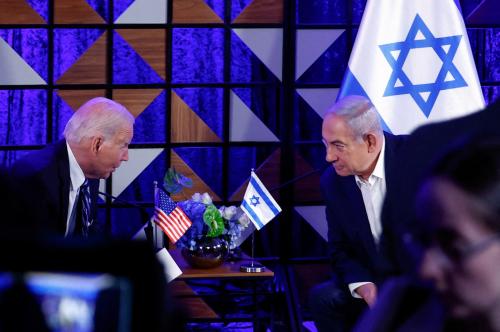Editors’ Note: The attack in Nice will inevitably, and appropriately, lead to more aggressive intelligence efforts against suspected ISIS networks and tighter security in general, writes Dan Byman. Unfortunately, they are also likely to bolster anti-Muslim voices in France and throughout Europe, and ISIS may in turn exploit Muslims’ resulting shame and anger. This post originally appeared on Slate.
At least 84 people are dead in Nice, France, after a truck deliberately plowed for over a mile through packed crowds celebrating Bastille Day; ISIS or one of its supporters is believed to be linked to the attack. As we reel in horror from yet another instance of terrorist carnage, news reports are trickling in, giving us a sense of the attack, its victims, and those behind the killings.
We’ll learn more in the days to come, but we already knew Europe—and France in particular—has a terrorism problem and that it may go from bad to worse in the near future. Ironically, one of the reasons for the increased attacks is the military successes the United States, France, and other countries and local fighters are scoring against ISIS’s core in Iraq and Syria and the setbacks suffered by ISIS’s key provinces such as that in Libya. ISIS, which had long trumpeted its success in establishing the now-shrinking caliphate, needs victories to compensate for these major losses. Earlier this month, CIA Director John Brennan warned, “As the pressure mounts on ISIL, we judge that it will intensify its global terror campaign to maintain its dominance of the global terrorism agenda.”
Running down people with a truck is a new form of violence for ISIS, though ISIS propaganda has called for supporters to kill by “ramming” people, al-Qaida’s Yemen branch recommended it in the past to “mow down the enemies of Allah,” and in 2008 a Palestinian used a bulldozer to kill three Israelis. But this is the fourth major terror attack in Europe in the past eight months: ISIS-directed terrorists killed 130 people in November in Paris; in March suicide bombers killed 32 people in Brussels, and just two weeks ago three men believed to be tied to ISIS killed more than 40 at the Istanbul airport.
The attacks will inevitably, and appropriately, lead to more aggressive intelligence efforts against suspected ISIS networks and tighter security in general. Unfortunately, they are also likely to bolster anti-Muslim voices in France and throughout Europe, fostering daily humiliations and furthering Muslim communities’ sense that they are suspect and under siege. ISIS will exploit the resulting shame and anger, increasing the risk of future attacks.
European nations face several types of terror threats from ISIS. The first is the unprecedented number of fighters—more than 5,000—that Europe has exported to Iraq and Syria to fight under the banners of ISIS and other jihadi groups. More than 900 of them (including 200 women) have come from France. More than 130 are dead, and almost 250 have returned; the rest are believed to still be in Iraq and Syria. The Paris attacks, which were coordinated and practiced, illustrate the danger such fighters can pose: Time in the battle zone allows them to gain fighting skills, become indoctrinated, and develop a network to exploit for future attacks. In addition, ISIS leaders can direct their operations to achieve maximal effect. As the so-called caliphate shrinks, more of these fighters may try to return. More than 1,000 other Frenchmen are believed to be radicalized but have not gone to Iraq and Syria, and this represents another overlapping danger. In the past many might have tried to go to Syria, but now, perhaps acting on directions from ISIS leaders with whom they are communicating or perhaps mixing with returned foreign fighters, these individuals might strike directly at France or other countries.
The last category are true “lone wolves”—those inspired by ISIS or other jihadi ideologies but with no direct operational connection to a group (the attacks in San Bernardino and Orlando appear to fall into this category). Two years ago ISIS propaganda emphasized coming to the “caliphate” to help it consolidate and expand. Earlier this year, however, its spokesman and external operations leader Muhammad al-Adnani declared, “The smallest action you do in the heart of their land is dearer to us than the largest action by us and more effective and more damaging to them.”
France, as we’ve seen, is particularly vulnerable. As my Brookings colleagues Will McCants and Chris Meserole have recently argued, French political culture is a counterterrorism problem. They found that “four of the five countries with the highest rates of radicalization in the world are Francophone, including the top two in Europe (France and Belgium).” Part of the problem are the large numbers of unemployed urban youth, a fertile field for radical recruiting. But part of it is also France’s aggressive secularization programs, which prohibit girls from wearing the veil in school and are considered by many Muslims to be a deliberate attack on their religion. Muslims’ trust in the government and security services is low. Add such a sense of humiliation to a surging far-right political movement that constantly blasts Muslim immigrants and citizens, and the conditions for radicalization are strong.
The United States is less vulnerable by comparison. Fewer than 300 Americans have gone to fight in Iraq and Syria. Part of this is because of an aggressive and effective law enforcement and intelligence effort to disrupt volunteers. But part of it is because the American Muslim community is far better integrated than its French counterpart and regularly cooperates with law enforcement. U.S. politics are becoming more poisonous toward Muslims, but—we can hope—that anti-Muslim sentiment in America may have peaked, and recent polls suggest positive attitudes toward Muslims are increasing.
Continued military and intelligence operations against the ISIS core by U.S.-led coalition forces and their local partners are necessary, but they will take time to bear fruit and in the end still don’t solve the terrorism problem. Stopping an attack like the one in Nice is exceptionally difficult. The attacker chose a “soft” (undefended) target and showed that one sick person can kill many with the right combination of determination and luck. Unfortunately, the most likely reaction after the Nice attack is also the worst one: more vitriol and hostility toward French and European Muslims, furthering a cycle that makes it harder for European security services to gain the cooperation of local communities and easier for ISIS to gain recruits and score victories.



Commentary
The vicious cycle of French terrorism
July 15, 2016